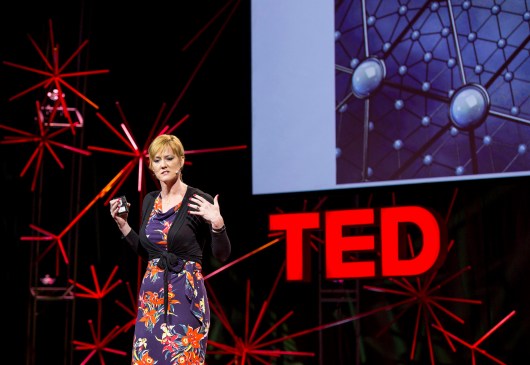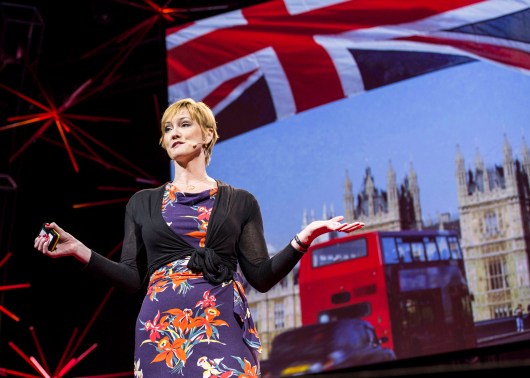Heather Brooke starts her talk by telling us a fairy tale. It’s a tale of children, scolded for daring to question the authority of their parents. Then a man comes to town and shares some secret documents stolen from the parents and revealing — shock! — that the parents are terribly badly behaved themselves.
It’s not really a fairy tale, of course. Brooke is telling her own story. Only in her case, the parents were the British government, and the secret documents were expense receipts of Members of Parliament. Yet, despite the fact that requesting access to them was superficially an innocuous question, Brooke had to file hundreds of Freedom of Information Act (FOIA) requests to get access. She fought her battle for five years, ending up in front of the High Court to make her case that this was relevant information for the public. Even after she won, parliament continued to hem and haw, even trying to change the law retroactively so that it no longer applied to them.
“What they hadn’t counted on was digitization,” she says. That meant that all the receipts were already in a database. And that meant that it wasn’t such a huge bother for someone to copy said database, put it on a disk and saunter on out to find the highest bidder. That, of course, was the Daily Telegraph, and the beginning of a scandal that captivated both the press and the public. As Brooke explains, six ministers resigned, the Speaker of the House resigned, 120 MPs left at the next election, and to date four MPs and two Lords have served time in jail for fraud. The audience is both horrified and impressed.
Yet Brooke tells us this story not to congratulate herself but to help us understand that the world and its systems of governance have changed. The people now have access to data–and they’re no longer content, if they ever were, to rely on those in power to do the right thing. “Everyone around the world wants to know what people in power are doing,” she says. “They want to have a say about what’s being done in their name and with their money.” This is no less than the second age of enlightenment, she argues. Only this time, “our printing press is the Internet; our coffee house is the social network.”
Yet while so many of our systems, including environmental companies and even financial services are moving towards more open and transparent systems, politics continues to resist any kind of transformation. We retain a top-down hierarchy and those in power continue to insist that everything will be alright as long as we trust they know what they’re doing. We mustn’t fall for this any more. She shares examples of some promising initiatives to help bring transparency to government: Seb Bacon built Alaveteli as a way to take the hassle out of FOIA requests. Birgitta Jonsdottir initially protested outside her Parliament when Iceland’s economy collapsed. Now she’s an MP, spearheading the Icelandic Modern Media Initiative to make the country into a publishing haven.
Of course, there’s no way to make FOIA requests for details on some political decisions. Many stories still emerge through illegitimate means such as leaks. She points to a front-page piece in The Guardian sparked by the leak of tens of thousands of dispatches written by American military officers about the war in Afghanistan.
And she brings up a story she worked on which involved the leaking of 250,000 diplomatic cables from a disgruntled Wikileaker. Brooke says she was struck by two things. Firstly, the pedestrian humanity of grand statesmen who, it turns out, are just as bitchy and small-minded as the rest of us. More seriously, she was struck by what she describes as “endemic corruption across countries centered around public officials embezzling public money for personal enrichment who are allowed to do this because of official secrecy.” It’s a sobering moment.
An aside on Wikileaks. Did Julian Assange and co demonstrate a commitment to radical openness, she asks. “I say no. Radical openness doesn’t mean abdicating power, it’s about being a partner with power. It’s about sharing accountability.” Then there’s the fact that Julian threatened to sue her because she received a leak of his leaks. “I think that showed an inconsistency in his ideology,” she comments drily.
Yet her real message is that we must be careful to retain two qualities when talking to power, a truly seductive force in its own right: skepticism and humility. “We must always be challenging,” she says. “You say that’s so? Show me the evidence.” Meanwhile we must show humility because we are all human. We all make mistakes. “If you don’t have those, it’s a short journey from reformer to autocrat. Read Animal Farm to get the message about how power corrupts people.”
So what’s the solution, she asks. First up, how about balancing the Official Secrets Act with an Official Disclosure Act whereby officials are punished if found to have witheld information that’s in the public interest. The audience loves this idea.
To close her thought-provoking talk, Brooke returns to the fairy tale with which she began. “The parents have panicked,” she says. “They’ve locked all the rooms. They’ve kitted out the house with CCTV cameras. They’ve built a spycenter to see who are the troublemakers. Is that a fairytale or a living nightmare?” It’s time for us to acknowledge that the world is not a fairy tale, and that it can both be more brutal than we care to acknowledge and might be better than we’ve been led to believe. “Either way, we have to see the world as it is, with all of its problems,” she concludes. “It’s only by seeing the problems we can fix them and live in a world where we can actually live happily ever after.”
Photos: James Duncan Davidson


Comments (2)
Pingback: The Digital Divide Is Evolving – How Can We Catch Up?
Pingback: The Digital Divide Is Evolving – How Can We Catch Up? : Learnosity Blog